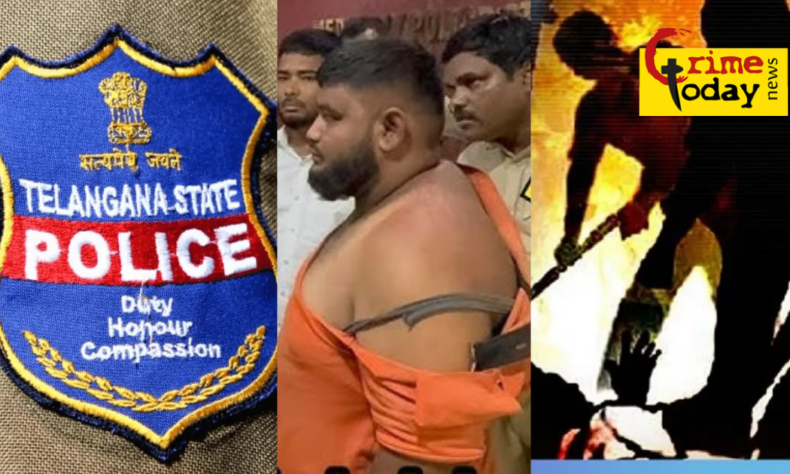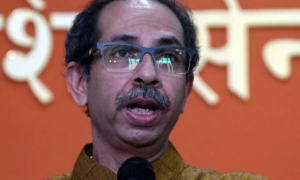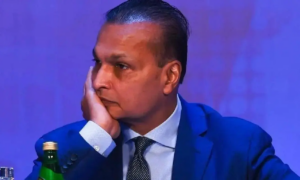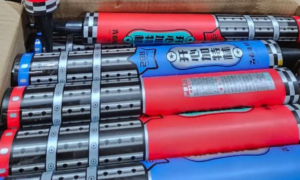
Cow Protection or Political Hooliganism?
Amjed Ullah Khan Calls Out Telangana Police Bias
By Naveed Uddin Khan Uzair
Hyderabad: Speaking exclusively to Crime Today News, Amjed Ullah Khan expressed deep concerns over what he described as increasing political hooliganism in Telangana, masked under the guise of cow protection. He pointed out that this trend began after Telangana became a separate state and Chief Minister K. Chandrashekar Rao (KCR) assumed office. According to Khan, since 2014, vehicles transporting animals for legitimate trade, particularly goats, have been consistently targeted and looted under the pretext of cow protection.
Khan clarified that no businessman was transporting cows, but instead bulls, black cattle, and buffaloes intended for sale, mostly for meat and other legal purposes. “From 2014, we kept informing the police and the government of that time, but KCR Sahab did not pay heed. His soft Hindutva policy has only encouraged this syndicate,” he remarked. He explained that the information about these animal transports is leaked from the source of purchase, resulting in organized groups intercepting these vehicles en route.
Khan further accused some police officers of being complicit in these acts, protecting the so-called ‘cow protectors’ instead of upholding the law. He claimed that there were several reports from local police stations indicating protection being given to vigilantes while the real victims—the drivers and traders—were left helpless. “The police are there to protect the public, but instead, they are guarding these hooligans,” Khan stated.
Nine Years of Silence
Khan criticized the Telangana government, especially KCR and KTR, for their silence on this issue for nine long years. He mentioned that during these years, various organizations representing the Qureshi community consistently brought up these concerns with Majlis-e-Ittehadul Muslimeen (MIM) leaders like Asaduddin Owaisi and Akbaruddin Owaisi. According to him, despite repeated requests and evidence of harassment, the political leaders limited their actions to symbolic meetings with the DGP and public statements promising future protests. “For nine years, Muslims have been suffering losses ranging from 8 lakhs to 1 crore rupees every year due to this unchecked harassment,” Khan added.
He detailed how young entrepreneurs from the Qureshi community, who would invest in buying bulls for Bakrid, faced substantial losses. “These young men would buy four bulls, hoping to earn a small profit, only to have their livestock seized and their livelihoods destroyed,” he said.
Police Complicity and Selective Enforcement
Khan also alleged that the Telangana police, particularly during the Bakrid season, become hyper-vigilant about animal cruelty laws that are otherwise ignored throughout the year. He pointed out that police officials would often stop trucks transporting goats and bulls under the pretense of checking for overcrowding or lack of water and fodder, only to fine or harass the traders. “If you bring healthy animals, they say you cannot slaughter them. If you bring sick animals, they claim it’s against Islamic principles. This is pure harassment,” Khan said.
He criticized the police for their “special obsession” with monitoring cattle transport only during Bakrid, setting up checkpoints that operate like border crossings. “It’s like they are setting up India-Pakistan borders, the way they stop and seize vehicles carrying animals. Is Shamshabad or Zahirabad a border region now?” he questioned.
Continued Inaction and Political Indifference
Khan remarked that during the nine-year rule of KCR, not once did the Chief Minister or KTR speak up against these incidents. “Their silence cost them the trust of the Muslim community, and now Muslims have voted for Congress. But what has changed?” he asked.
Khan recalled how Congress leaders, including Rahul Gandhi, Sonia Gandhi, Priyanka Gandhi, and Telangana Congress leaders like Revanth Reddy, made promises of protecting Muslim rights and improving community welfare during their election campaigns. However, he lamented that after Revanth Reddy became the Chief Minister, the harassment continued just the same. “We still see police pickets and vigilante check posts on Shamshabad road, Nalgonda road, and every major highway where animals are transported. The harassment hasn’t stopped,” Khan asserted.
Also Read: Amjed Ullah Khan Urges Telangana CM Revanth Reddy to Take Action Against Vigilante Attacks
A Call for Accountability
Khan concluded his statement by demanding immediate action from the Telangana government and the police department. He called upon Revanth Reddy to intervene and ensure that the rights of lawful traders are protected and that vigilantism is curbed. He also appealed to local MIM leaders to move beyond symbolic gestures and take decisive action against the perpetrators.
“Justice delayed is justice denied,” Khan warned, emphasizing that if the government continues to ignore these incidents, the people would eventually lose faith in its ability to protect their rights.
The community now waits to see if these serious allegations and cries for justice will prompt the necessary action from Telangana’s political and law enforcement leadership.
Conclusion:
The allegations raised by Amjed Ullah Khan cast a stark light on the complex and contentious issue of cow protection in Telangana. His claims of political hooliganism masked under the guise of gau raksha (cow protection) expose a troubling pattern of harassment and lawlessness, allegedly facilitated or ignored by local authorities. The disturbing reports of violence, illegal vehicle stoppages, and police complicity point to a deeper issue of biased enforcement and political influence. If true, this not only erodes public trust in the police force but also challenges the very essence of law and order that the Telangana government is sworn to uphold.
Chief Minister Revanth Reddy, who came to power with promises of safeguarding minority rights and restoring justice, now faces a critical test. Immediate and unbiased intervention is necessary to ensure that the law is applied equally, without political or communal bias. Addressing the concerns raised by Khan requires not just verbal assurances but concrete action, beginning with strict action against vigilantism and unlawful activities carried out under the pretext of cow protection.
For the police, this is a moment to reflect on their role as protectors of the public, irrespective of religious or community lines. Upholding the law means standing against unlawful seizures and violence, even when carried out by politically backed groups. Transparency in handling cases and accountability for officers who enable or ignore vigilantism are crucial to restore faith in law enforcement.
As for the gau rakshaks (cow protectors), genuine protection of animals must be distinguished from politically motivated violence. True cow protection does not justify attacking transporters, seizing property, or inflicting violence without legal grounds. If their cause is legitimate, it must operate within the boundaries of the law, with cooperation from legal authorities, not through vigilantism and mob rule.
The Telangana government must take these concerns seriously and initiate transparent investigations into these incidents. Restoring public trust and ensuring justice for all communities is not just a political obligation—it is a moral one.
This article is published by Crime Today News ©






